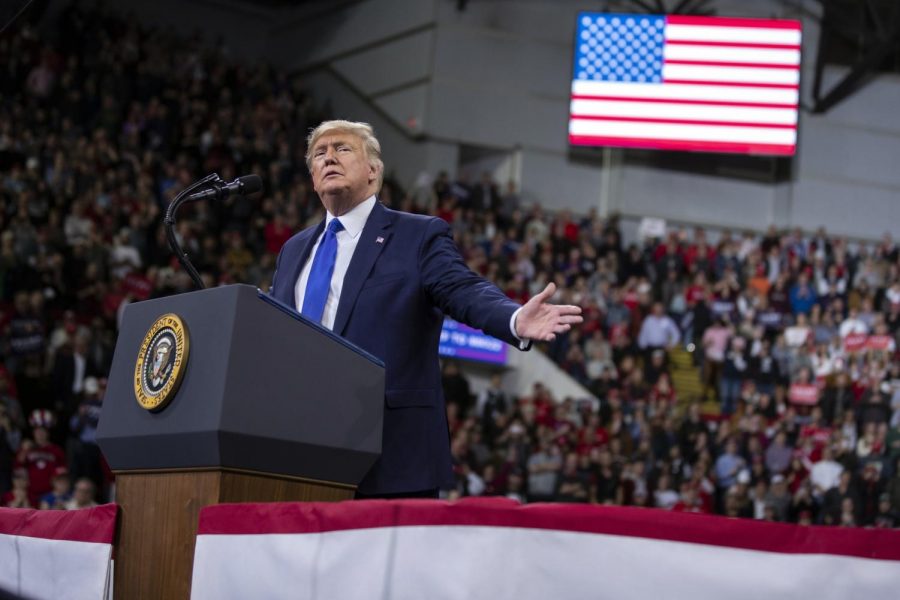Opinion: Judge foreign policy based on the policy, not the man
President Donald Trump speaks during a campaign rally at UW-Milwaukee Panther Arena, Tuesday, Jan. 14, 2020, in Milwaukee. (AP Photo/ Evan Vucci)
January 25, 2020
Conceptualize your worldview, perspectives, and knowledge as a rolling sphere, not unlike a snowball. It accumulates mass and grows in size as it perpetually rolls, as you perpetually learn from personal experiences or from others.
That ever-growing snowball of knowledge will encounter, at some point, some piece of information, experience, or perspective that is incompatible with that ball. When your worldview or the complex set of information that is your knowledge meets something that doesn’t fit, one of two things will happen: either you ignore this new information, rolling over it and leaving it behind, or it fundamentally changes how you see the world.
People should allow for the possibility that they are mistaken, and they should not consider it vulnerability without reward. Many people consider this vulnerability a lack of confidence in one’s values or intellectual cowardice, but I think it’s more courageous for people to challenge their own perspectives, even if it means disagreeing with your friends.
I feel that a plurality if not a majority of the Loyola community may not be objective when evaluating the American airstrike that killed Irani General Qasem Soleimani, who commanded the Quds force.
While I’m not arguing for it in this forum, I don’t think the criticism has been completely fair. Some have argued the airstrike was wrong because it was done without consulting the legislature. However, they should consider the hands-off approach Congress has had in the War on Terror over the past two decades, allowing President Barack Obama 542 drone strikes that killed 3,797 — 324 of whom were innocent civilians, a blog post on the Council on Foreign Relations website said and snopes.com confirms.
Obama’s administration, with congressional consent, has broadly interpreted the authorities granted to the White House, arguably creating a precedent for President Trump’s administration to follow.
President Obama’s administration commanded drone strikes in Pakistan, Yemen and Somalia, using authority from the Authorization to Use Military Force Against Terrorist joint resolution that was passed by congress to deal with al-Qaeda in the wake of 9/11.
“The President is authorized to use all necessary and appropriate force against those nations, organizations, or persons he determines planned, authorized, committed, or aided the terrorist attacks that occurred on September 11, 2001, or harbored such organizations or persons, in order to prevent any future acts of international terrorism against the United States by such nations, organizations or persons,” the 2001 AUMF says.
This joint resolution was intended to end al-Qaeda attacks and prevent them from happening again, and it authorizes military actions against those who orchestrated the attack and those who harbored the attackers.
However, the Obama presidency has used the AUMF to justify attacks against organizations or people that have once associated with al-Qaeda.
In 2013, the Senate Armed Services Committee learned that the Obama administration used the AUMF to authorize attacks against what Department of Defense representatives called “associated forces.”
Senator Tim Kaine had told Radiolab that DoD representatives argued that the AUMF would cover individuals that are members of organizations associated with al-Qaeda even if they were born after 9/11.
Kaine told Radiolab the AUMF is not limited in time or geography. Theoretically, the AUMF could be used in a perpetual war against people, organizations or nations that the executive branch interprets as associated with al-Qaeda.
President Trump’s administration could have interpreted his executive war powers as broadly as Obama’s did, which could give him the authority to strike Soleimani, and while I acknowledge that the strike that killed Soleimani was unprecedented in many ways, when it comes to the breadth of the interpretation of the president’s military powers, it wasn’t.
President Trump’s administration follows more than one presidential precedent of using congressional authorizations in ways perhaps unintended by Congress, and if we want it to stop then we shouldn’t let Congress defer its constitutional war powers to the president so broadly — or perhaps end the “War on Terror.”








